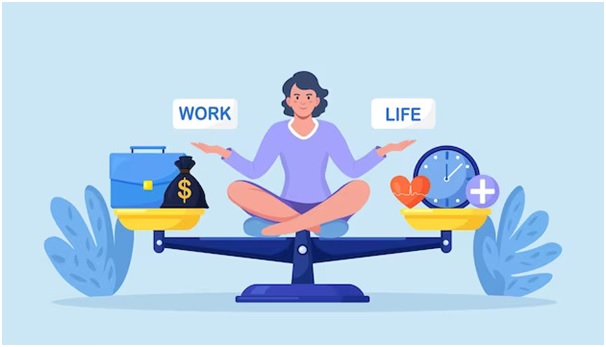In today’s fast-paced world, striking a balance between work and personal life has become increasingly challenging. It is a struggle that women employees face more than men. Juggling a career and family responsibilities can be daunting, leading to stress, burnout, and an overall decline in physical and mental health. Therefore, it is essential to understand the significance of work-life balance and how online counselling can help working women overcome the obstacles they face.


Achieving a healthy work-life balance is essential for individuals to lead fulfilling lives. It involves managing work and personal responsibilities in a way that allows for enough time and energy to be devoted to both areas.
The significance of work-life balance can be seen in the following ways:
- Improved Physical and Mental Health: A healthy work-life balance can help prevent burnout, stress, and other physical and mental health issues. When individuals are constantly working and neglecting their personal lives, it can lead to exhaustion, anxiety, and depression. By finding a balance between work and personal life, individuals can reduce stress levels, improve their mental health, and enhance their overall well-being.
- Increased Productivity: Striking a balance between work and personal life can lead to increased productivity. When individuals have enough time for leisure activities, family, and friends, they tend to feel more energized and motivated when they return to work. This can lead to increased productivity, better job performance, and career growth.
- Enhanced Relationships: Maintaining a healthy work-life balance can also improve relationships. When individuals have enough time for family and friends, it can lead to stronger relationships and more meaningful connections. This, in turn, can contribute to improved mental health and overall well-being.
- Reduced Burnout: When individuals are constantly working and neglecting their personal lives, it can lead to burnout. Long-term stress can lead to a state of burnout, which is characterised by emotional, physical, and mental depletion. By finding a balance between work and personal life, individuals can prevent burnout and maintain their well-being.
- Improved Job Satisfaction: Finding a balance between work and personal life can lead to improved job satisfaction. When individuals have enough time for leisure activities and personal interests, they tend to feel more fulfilled and happier in their jobs. This can contribute to better job performance, career growth, and overall job satisfaction.
Working women face unique challenges that can make it difficult to achieve a healthy work-life balance. These challenges can be attributed to a range of factors, including traditional gender roles, social and cultural expectations, and workplace discrimination.
The following are some of the common challenges that working women face:
- The Double Burden of Work and Home Responsibilities: Women are often expected to manage both their work and home responsibilities, which can be overwhelming. They may have to take care of children, elderly parents, or household chores, in addition to their work responsibilities. This can lead to time and energy constraints, leaving women with little to no time for self-care or leisure activities.
- Gender Discrimination and Bias: Women often face gender bias and discrimination in the workplace, which can affect their career growth and work-life balance. This may include unequal pay, limited job opportunities, and lack of support for maternity leave and flexible work arrangements. These factors can create “relationship counsellor” stress and frustration, leading to poor work-life balance.
- Limited Access to Flexible Work Arrangements: Flexible work arrangements, such as telecommuting or flexible working hours, can help women balance work and personal responsibilities. However,counseling for relationship women may face resistance or limited access to such arrangements due to organizational policies, job requirements, or lack of support from supervisors and colleagues.
- Inadequate Support Networks: Women may also lack adequate support networks, such as mentors, colleagues, or family members, to help them manage work and personal responsibilities. This can create a sense of isolation and loneliness, leading to poor mental health and work-life balance.
- Work Overload and Job Insecurity: Women may also face work overload, where they have too many responsibilities and little control over their workload. Additionally, job insecurity can also lead to stress and anxiety, affecting work-life balance.
Online counselling can be an effective tool for working women to overcome the obstacles they face in achieving work-life balance. It provides a safe and confidential space for women to discuss their concerns and challenges. Counsellors can help women identify their priorities, set realistic goals, and develop strategies to manage their time effectively. They can also help women navigate gender biases and discrimination in the workplace, providing them with the necessary tools to advocate for themselves and advance in their careers.
Online counselling also provides the convenience of being able to access support from anywhere, at any time. This is particularly beneficial for working women who may have limited time to attend in-person counselling sessions. With online counselling, women can schedule sessions at their convenience, making it easier to balance their work and personal life.
In conclusion, achieving work-life balance is essential for leading a happy and healthy life. Women employees face several obstacles that can make it challenging to achieve a healthy work-life balance. However, online counselling can be an effective tool for working women to overcome these obstacles and achieve a better balance between work and personal life. With the right support and strategies, women can lead fulfilling lives, both at work and at home.















